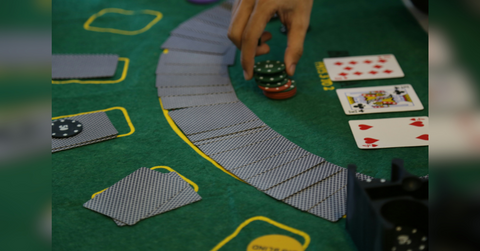 NEWS
NEWSThe House Always Wins: 2026 Budget Slaps Bettors With a Tax Sucker Punch

Sept. 29 2025, Published 1:22 a.m. ET
- Frank Ammirante
- September 23, 2025
I’ve been gambling long enough to know that the house edge never sleeps. But I didn’t expect Uncle Sam to suddenly grab a seat at the blackjack table, grinning like a pit boss with fresh ammo. With the passage of the One Big Beautiful Bill Act, effective January 2026, every bettor in America just got a new silent partner: the IRS.
Until now, the deal was straightforward: win big, lose big, and at tax time you could wash those figures against each other. Winnings and losses danced a fair two-step. If I hit a lucky streak at the poker table and then gave it all back on a cold weekend in Vegas, I at least had the satisfaction of knowing my tax return reflected the brutal symmetry of the game. However, that’s no longer the case, even at the top offshore sportsbooks.
Bettors Could Face Issues Come Tax Season
Starting next year, I’ll only be able to deduct 90% of my gambling losses against winnings. Ten percent of every stumble becomes taxable “phantom income.” That’s right, if I win $100,000 and lose $100,000, the IRS still pretends I pocketed $10,000. Imagine breaking even and still getting kicked in the teeth by a tax bill. It’s like going bust at roulette and then tipping the dealer with money you don’t even have.
The government dresses this up as a budget move, plugging a few billion-dollar leaks in the bloated 2026 spending plan. But let’s be clear: they aren’t balancing the budget; they’re balancing it on our backs. Casual bettors might not notice right away, but for professional gamblers, poker pros, or even that guy grinding parlays on his couch, this is a tectonic shift.
And it’s not just about money: it’s about fairness. Losses are part of the game. Pretending otherwise is like outlawing rain when you’re forecasting crops. You can’t separate the highs from the lows, the wins from the losses. The feds are essentially saying: We’ll tax your sunshine but ignore your storms.
Resistance from Politicians
Thankfully, not everyone is letting this slide. Enter Rep. Dina Titus from Nevada, who just dropped the FAIR BET Act (H.R. 4304) on the House floor. The bill’s name isn’t just catchy, it’s a promise. It would restore full, dollar-for-dollar deductions for losses. Titus knows what’s at stake: her district runs on casinos and sportsbooks, and the idea of taxing players on phantom gains is enough to make even the dealers spit out their comped coffee.
Early signals suggested bipartisan curiosity, some Republicans smell government overreach, while some Democrats see an attack on working-class hobbyists who just want to throw a few bucks at their team without a tax noose waiting. But curiosity doesn’t equal courage. This is Congress, after all. Momentum can fizzle faster than a busted straight draw. Here in Georgia, where 68% of Georgians have said they want sports betting approved, we are not even given the chance to pay these extra taxes. What ever happened tp "We the People"? It's bad beat after bad beat.
Want OK! each day? Sign up here!
FAIR BET Act Has Stalled This Fall
The problem? The FAIR BET Act already stalled in September, getting blocked by the GOP-controlled House Rules Committee, which determines if amendments can reach the floor. This could have bettors feeling the heat. Once at the table, and again in April when they file. The government scores a guaranteed win without ever anteing up. And me? I’ll be forced to rethink every wager, knowing that the IRS has rewired the odds against me.
It doesn’t stop there. Here’s the part that really burns: gambling already isn’t a level field. States regulate, casinos tilt the rules, sportsbooks juice the lines. But we accept those terms because it’s voluntary: we step into the arena with our eyes open. On the other hand, the tax code shouldn’t be another crooked dealer. It should call the game straight.
Next Steps for FAIR BET Act
The good news is that Rep. Titus has pledged to continue fighting for this amendment. Combined with advocacy groups like the American Gaming Association, perhaps Congress pulls through and restores sanity. Maybe Titus rallies enough allies to remind lawmakers that betting is part of American culture, whether it’s poker, horses, fantasy leagues, or the March Madness office pool. Or maybe they don’t, and 2026 becomes the year that gamblers realize the house doesn’t just win, it’s in Washington, and it’s taking a cut of your losses too. We will have to wait until 2026 for a resolution.
I’ve lived by one rule in gambling: you play the cards you’re dealt. But when the dealer starts stacking the deck, even the sharpest player doesn’t stand a chance. And right now, America’s gamblers are being dealt from the bottom, at least for the time being.


